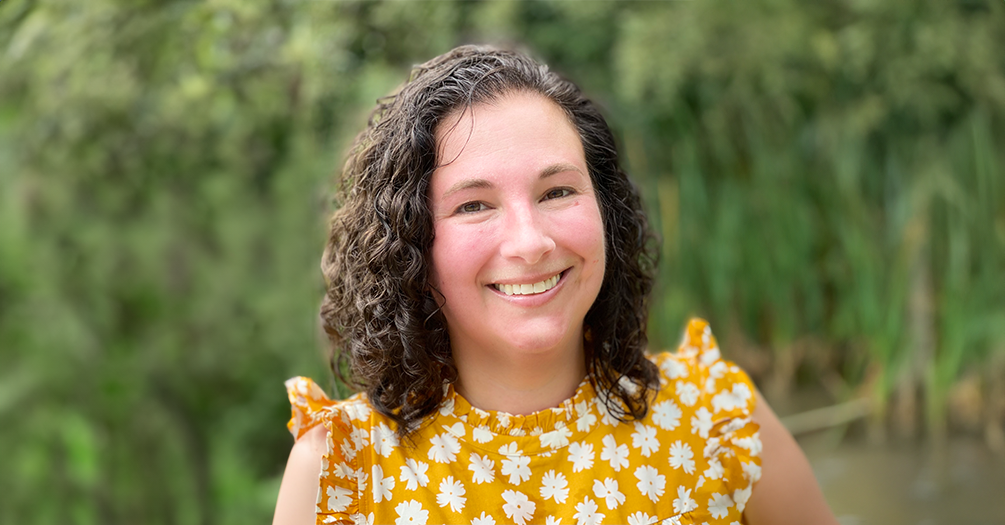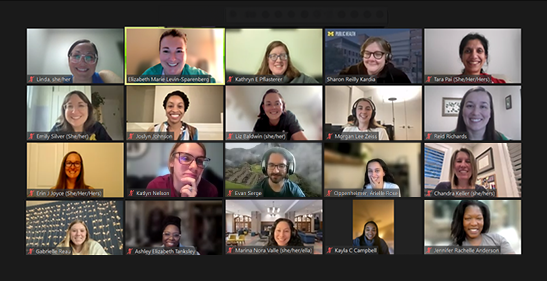Alumna transitions from pandemic frontlines to inspiring instructor

Elizabeth Levin-Sparenberg, MPH ’07, PhD ’16
Instructor, Online MPH in Population and Health Sciences
The University of Michigan School of Public Health has, for some time, built up a bustling virtual community, one that much of the residential student body has yet to experience.
If they had, like most of the graduate students in the online Master of Public Health (MPH) program, they’d be aware of a much loved presence in the online space: an instructor whose journey embodies the spirit of resilience, adaptability and unwavering commitment to public health.
Elizabeth Levin-Sparenburg, MPH ’07, PhD ’16, has been teaching exclusively in the online MPH program for two years. She’s become an inspiring figure among the online graduate cohorts and known for her compassion.
Her professional journey took an unexpected turn when the world was grappling with the challenges of the COVID-19 pandemic. With four young children at home, Levin-Sparenberg found herself at a crossroads. As the pandemic swept across the globe, she felt a calling to contribute her expertise to the frontline efforts.
Despite the immense challenges and uncertainties, Levin-Sparenberg made the decision to become a full-time epidemiologist, working tirelessly to combat the spread of the virus.
“Suddenly, we were in a worldwide pandemic and I thought, ‘This is what I've been training for my whole career,’” said Levin-Sparenberg, who has a Master of Public Health in Epidemiology and a PhD in Epidemiologic Science from Michigan Public Health. “I've got to get involved.”
Her transition to the frontline was met with both challenges and rewards.
Levin-Sparenberg found herself navigating the complexities of public health policymaking, community outreach and the delicate balance between science and public perception.
“We were all just working around the clock trying to kind of tame the spread and the effects of the pandemic,” she said.
I think everybody that was on the frontlines of the pandemic can tell you, the burnout is real.
Amidst the fog of the pandemic, an unexpected opportunity arose. A former professor reached out to Levin-Sparenberg with an offer to join the faculty at Michigan Public Health, teaching in the online MPH program.
For Levin-Sparenberg, it felt like a lifeline. Two years into the pandemic, the stress of the pandemic was taking its toll.
“I think everybody that was on the frontlines of the pandemic can tell you, the burnout is real,” she said.
The offer was a chance to shift her focus from crisis management to education, and so she went from the frontline to the classroom.
“While I was glad to put all my public health training in practice, it was stressful,” Levin-Sparenberg said. “Going from what were sometimes hostile interactions with the public—with COVID-19 being so politicized—and moving into a situation where everybody was on the side of public health, it was such a positive thing. The students are just eager to learn about public health and to go out and to make a difference.”
As an alumna of the Department of Epidemiology, Levin-Sparenberg was able to bring a unique perspective to her teaching, drawing from her own experiences as a student and graduate student instructor (GSI), and as a practitioner in the field.
Her journey from student to instructor has come full circle, allowing her to mentor and inspire the next generation of public health leaders.
“It's been interesting to see how the experience has evolved since I was a student,” she said. “And especially in teaching in the online classroom, it is just so different from when I did my studies.”
One of the hallmarks of Levin-Sparenberg’s teaching philosophy is her emphasis on work-life balance—a lesson she learned firsthand as a working mother juggling the demands of career and family.
Teaching exclusively online allows Levin-Sparenberg to integrate her personal life into her professional role. Her children often make cameo appearances during her lectures, offering students a glimpse into her world outside the classroom.
“I like my children to see that mommy is a scientist, that mommy works," Levin-Sparenberg said. “I want my students to see that my family is important to me, just like their families are important to them.
This job has allowed me to have a good work-life balance. I want my students to have that too.
“This job has allowed me to have a good work-life balance. I want my students to have that too. Especially if we believe in public health; we should care about our employees, our students— their whole package, their whole life.”
Levin-Sparenberg’s approach to teaching is rooted in empathy, understanding and flexibility. She recognizes that her students are not just learners but also professionals with diverse backgrounds and commitments. She strives to create a supportive learning environment where students feel valued, heard and empowered to succeed.
“It feels like I was in their shoes not very long ago,” she said. “I was so stressed out during my master’s and PhD programs. I always think, how can I make this enjoyable rather than stressful?”
“I want my students to learn, to build passion for public health and to feel supported every step of the way. If there's something causing unnecessary stress, I want to remove it. I want my students to thrive, not just survive.”

Levin-Sparenberg teaching in the virtual classroom.
In the online MPH program, Levin-Sparenberg supported the growth of a community of like-minded individuals dedicated to making a difference in the world. Through her teaching, she hopes to foster connections, facilitate learning and inspire positive change in the field of public health.
“These students are just so impressive with their knowledge, their ideas, how they’ve been involved in their own communities, their level of passion and activism,” she said. “They’re all doing so many amazing things and I get to learn and live vicariously through each one of them.”
As Levin-Sparenberg continues her journey as an instructor, she remains committed to her mission of building public health capacity, one student at a time. In an evolving landscape of public health, her story serves as a testament to the transformative power of education, the necessary resilience of those who serve others, and the enduring impact of community - however you access it.
